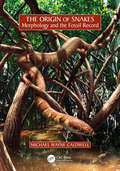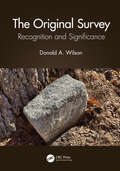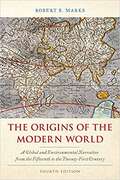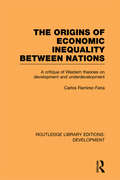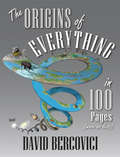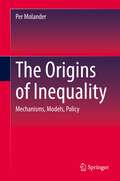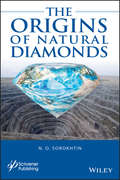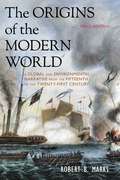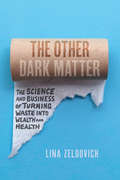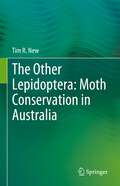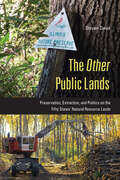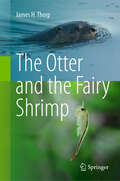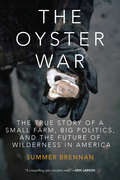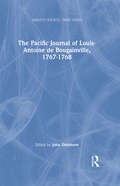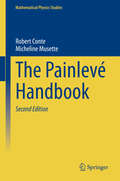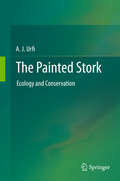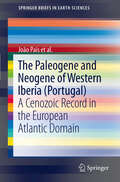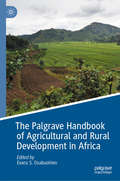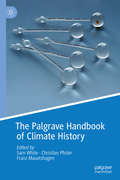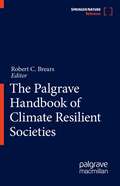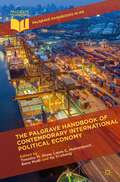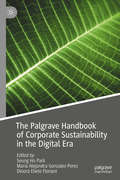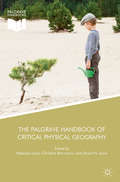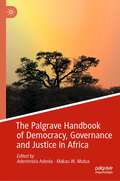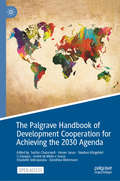- Table View
- List View
The Origin of Snakes: Morphology and the Fossil Record
by Michael Wayne CaldwellThis book presents perspectives on the past and present state of the understanding of snake origins. It reviews and critiques data and ideas from paleontology and neontology (herpetology), as well as ideas from morphological and molecular phylogenetics. The author reviews the anatomy and morphology of extant snakes. Methods are also critiqued, including those empirical and theoretical methods employed to hypothesize ancestral ecologies for snakes. The modern debate on squamate phylogeny and snake ingroup phylogeny using molecules and morphology is examined critically to provide insights on origins and evolution. Key Features Important major evolutionary transformation in vertebrate evolution Continuing historical debate in vertebrate paleontology Of wide interest to a core audience of paleontologists, herpetologists, and morphologists Author acknowledged as prominent contributor to debate over snake origins Based on remarkable well preserved fossil specimens
The Original Survey: Recognition and Significance
by Donald A. WilsonThe most comprehensive treatment of key elements of original surveys, and the research required to find them, which is an important issue in retracement surveys that has never been fully explored. It will help surveyors become familiar with the proper identification and requirements and find the appropriate evidence using proper procedures. The most comprehensive treatment of key elements of original surveys and the research required to find original surveys, is an important issue in retracement surveys that has never been fully explored. It emphasizes the importance and the necessity of determining the creation of the title and its sources along with its accompanying survey or location. The case studies included in the book discuss the consequences when investigators do not follow complete research procedures, and act upon less information, even though the law requires otherwise. This is a practical guide for surveyors to become familiar with the proper identification and requirements and find the appropriate evidence using the right procedures. This book is intended for the practicing surveyor and will be useful to the legal profession, historical researchers, federal land departments, and others interested in surveys. Features This is the first book that focuses on identifying original surveys, written by one of the top consultants in the United States, who brings real case examples of both successes and failures Explains land separation techniques when more than one has been used previously. Includes numerous case examples providing context for surveyors and attorneys Discusses the relation between title creation and their transfer Addresses federal versus private surveys, their differences, and similarities
The Origins Of The Modern World: A Global And Environmental Narrative From The Fifteenth To The Twenty-first Century
by Robert B. MarksThe Origins of the Modern World: A Global and Environmental Narrative from the Fifteenth to the Twenty-First Century (World Social Change)
The Origins of Economic Inequality Between Nations: A Critique of Western Theories on Development and Underdevelopment (Routledge Library Editions: Development)
by Carlos Ramirez-FariaFirst published in 1991 this text provides an incisive analysis of theories concerning the origins of economic inequality between nations. Central to the author’s investigation is the concept of underdevelopment, and a focus on successive Western ‘systems of conceptualisation’ of the relationship between the west and the rest of the world. The first part of the book concerns the Marx/Engels theory of the Asiatic mode of production, and the anti-Imperialist reaction against Eurocentrisim initiated by the theoretical synthesis of J. A. Hobson. This is followed by an examination of the post-World War II era, particularly the evolution of development studies and the differing versions of dependency theory. The author concludes with an analysis of the most recent reactions against economic imperialism and dependency theory, and concludes with an assessment of their implications for the further economic development of today’s Third World.
The Origins of Everything in 100 Pages (More or Less)
by David BercoviciCovering 13.8 billion years in some 100 pages, a concise, wryly intelligent history of everything, from the Big Bang to the advent of human civilization.With wonder, wit, and flair—and in record time and space—geophysicist David Bercovici explains how everything came to be everywhere, from the creation of stars and galaxies to the formation of Earth&’s atmosphere and oceans, to the origin of life and human civilization. Bercovici marries humor and legitimate scientific intrigue, rocketing readers across nearly fourteen billion years and making connections between the essential theories that give us our current understanding of topics as varied as particle physics, plate tectonics, and photosynthesis. Bercovici&’s unique literary endeavor is a treasure trove of real, compelling science and fascinating history, providing both science lovers and complete neophytes with an unforgettable introduction to the fields of cosmology, geology, genetics, climate science, human evolution, and more.&“For determined minds hoping for cogent, clever explanations for what we know of the history of the universe, Bercovici nails it.&” —Shelf Awareness &“Explaining life, the universe and everything in 100 pages may be a tall order, but physicist and volcano enthusiast Bercovici rises to the challenge. . . . Origins delivers on its promise—and (bonus!) it&’s even fun to read.&” —Discover&“Clear, concise, comprehensive, and written with verve and a sense of humor, The Origins of Everything is a delightful journey through time from the big bang to the present day.&” —Doug Macdougall, author of Frozen Earth
The Origins of Inequality: Mechanisms, Models, Policy
by Per MolanderThis book presents a unified approach to the problem of inequality, combining results from a variety of research fields – the human life cycle, group dynamics, networks, markets, and economic geography. Its main message is that inequality emerges as the natural result of mechanisms operating both in individual human development and in social interaction. It posits that inequality is not an anomalous deviation from a naturally egalitarian social structure; quite to the contrary, inequality is to be expected as part of the human condition. The author states that the growth of inequality, on the other hand, is not a natural law – the level and character of inequality can be affected by collective decisions. This perspective on human inequality has potentially far-reaching consequences both for the political philosophy of inequality and for public policy-making.This book is of interest to a wide interdisciplinary social science readership, including public policy, decision sciences, economic geography, and life course studies.
The Origins of Natural Diamonds
by N. O. SorokhtinThis is not just the story of the origin, evolution, and production of diamonds, but a story about the evolution of the Earth’s geology in general. Important to geologists, geophysicists, and engineers across multiple disciplines, written by an expert in the field and an expert on the Earth’s geological evolution, this volume represents the state-of-the-art in major Earth geological processes. Of particular importance to mining engineers and petroleum engineers, it is also a practical guide for those who work in the mining or petroleum industry. Valuable as either a learning tool for the student or as a reference or refresher for the veteran scientist or engineer, the author explains important geological processes, such as the Earth’s origin, composition, and structure, the Earth’s energy balance, continental drift, tectonic activity, the evolution of the Earth’s crust, and others. It is within this geological framework that the author offers practical guidance for engineers and scientists who work in industry or academia. It is a must-have for any geologist, geophysicist, or engineer working in mining or petroleum engineering.
The Origins of the Modern World: A Global and Environmental Narrative
by Robert B. MarksThis clearly written and engrossing book presents a global narrative of the origins of the modern world from 1400 to the present. Unlike most studies, which assume that the rise of the West is the story of the coming of the modern world, this history, drawing upon new scholarship on Asia, Africa, and the New World and upon the maturing field of environmental history, constructs a story in which those parts of the world play major roles, including their impacts on the environment. Robert B. Marks defines the modern world as one marked by industry, the nation state, interstate warfare, a large and growing gap between the wealthiest and poorest parts of the world, increasing inequality within the wealthiest industrialized countries, and an escape from the environmental constraints of the biological old regime. He explains its origins by emphasizing contingencies (such as the conquest of the New World); the broad comparability of the most advanced regions in China, India, and Europe; the reasons why England was able to escape from common ecological constraints facing all of those regions by the eighteenth century; a conjuncture of human and natural forces that solidified a gap between the industrialized and non-industrialized parts of the world; and the mounting environmental crisis that defines the modern world. Now in a new edition that brings the saga of the modern world to the present in an environmental context, the book considers how and why the United States emerged as a world power in the twentieth century and became the sole superpower by the twenty-first century, and why the changed relationship of humans to the environmental likely will be the hallmark of the modern era the Anthropocene. Once again arguing that the U. S. rise to global hegemon was contingent, not inevitable, Marks also points to the resurgence of Asia and the vastly changed relationship of humans to the environment that may in the long run overshadow any political and economic milestones of the past hundred years.
The Other Dark Matter: The Science and Business of Turning Waste into Wealth and Health
by Lina ZeldovichGrossly ambitious and rooted in scientific scholarship, The Other Dark Matter shows how human excrement can be a life-saving, money-making resource—if we make better use of it. The average person produces about four hundred pounds of excrement a year. More than seven billion people live on this planet. Holy crap! Because of the diseases it spreads, we have learned to distance ourselves from our waste, but the long line of engineering marvels we’ve created to do so—from Roman sewage systems and medieval latrines to the immense, computerized treatment plants we use today—has also done considerable damage to the earth’s ecology. Now scientists tell us: we’ve been wasting our waste. When recycled correctly, this resource, cheap and widely available, can be converted into a sustainable energy source, act as an organic fertilizer, provide effective medicinal therapy for antibiotic-resistant bacterial infection, and much more. In clear and engaging prose that draws on her extensive research and interviews, Lina Zeldovich documents the massive redistribution of nutrients and sanitation inequities across the globe. She profiles the pioneers of poop upcycling, from startups in African villages to innovators in American cities that convert sewage into fertilizer, biogas, crude oil, and even life-saving medicine. She breaks taboos surrounding sewage disposal and shows how hygienic waste repurposing can help battle climate change, reduce acid rain, and eliminate toxic algal blooms. Ultimately, she implores us to use our innate organic power for the greater good. Don’t just sit there and let it go to waste.
The Other Lepidoptera: Moth Conservation in Australia
by Tim R. NewConservation interest in moths, by far the predominant components of Lepidoptera, lags far behind that for butterflies, for which conservation practice provides many well-established lessons for extension to their near relatives. The needs of moths are at least as great, but their greater richness and variety, and far poorer documentation of diversity and biology over much of the world contribute to this lack of attention. Australia’s rich moth fauna, largely endemic and of global interest, illustrates many of the problems of developing wider interest and support for moth conservation. Numerous species (perhaps half the total fauna) are undescribed, and many are ecological specialists in restricted and vulnerable environments over small parts of the continent. Establishing their conservation status and needs whilst accepting that foundation knowledge is highly incomplete and much species-focused conservation is impracticable provides complex problems in setting priorities, based largely on wider diversity and effective advocacy. Most Australian vegetation systems, from grassland to forest and from sea-level to alpine zones, have been eroded in extent and quality since European settlement, resulting in massive habitat changes for native insects and to leave fragmented (and commonly degraded) remnants in which moths and others may persist. Recent surveys continue to increase recorded moth richness, reveal local faunal peculiarities, and indicate how assemblage changes may mirror wider environmental changes. This book is an overview of advances in documenting and interpreting moth diversity and ecology, to show how information from better-studied moth faunas can help in planning conservation of Australia’s moths through measures such as understanding the moths themselves by increased surveys and study, the factors influencing their diversity and wellbeing, and how such threats may be countered through increased coordinated conservation interest, commitment and management.
The Other Public Lands: Preservation, Extraction, and Politics on the Fifty States' Natural Resource Lands
by Steven DavisFor most Americans, state lands are the most readily accessible type of public land; however, despite their ubiquity, they remain largely terra incognita. The Other Public Lands is a primer on state public lands and the political dynamics that underlie their management. Offering a wide-angle overview, Steven Davis focuses on how states prioritize competing claims related to conservation, resource development, tourism, recreation, and finances. The Other Public Lands looks at both differences and common patterns in state land management, including the structure of natural resource agencies. Davis examines the privatization and commercialization of state parks, and the tensions between recreation, revenue and the preservation of biodiversity and natural landscapes. He also raises issues about equity, access, appropriate development, and ecological health. Chapters review state forests, state wildlife management areas, and school trust lands. In addition, the roles of interest groups, the courts, and agency culture and behavior are compared and analyzed both between states and the federal government and between states with differing approaches to specific issues. As there has been a demand to transfer at least some federal lands to the states, The Other Public Lands concludes with an appraisal of whether states could handle this transfer and goes on to suggest ways to ensure adequate access in an era of increased demand.
The Otter and the Fairy Shrimp
by James H. ThorpThis book presents information on common-to-rare organisms from around the world that inhabit freshwater habitats. The first six chapters focus on organisms from the very small (e.g., protozoa, zooplankton, and fairy shrimp) to the huge (e.g., hippos, freshwater sharks, and giant turtles), while the last four chapters provide information on aquatic ecosystems (lakes, streams, caves, and wetlands). Included in this last section are the physical nature of the system and how that influences the kinds of animals living there. This unique “nature” book, incorporating information from around the world on both aquatic systems and organisms, is written to attract the interest of a wide group of non-academic readers.
The Oyster War: The True Story of a Small Farm, Big Politics, and the Future of Wilderness in America
by Summer BrennanIt all began simply enough. In 1976 the Point Reyes Wilderness Act was passed with broad support, giving more than 33,000 acres of forest, grassland and shoreline the highest possible environmental protection in America. Those lands were to include a rare marine sanctuary, the Drakes Estuary, as "potential wilderness." Located in that estuary was a small, struggling oyster farm. In existence for more than eighty years, it was accused of doing environmental harm. In 2005 the farm was given notice by the National Parks Service that its lease on the property, due to expire in 2012, would not be renewed. The intention was to allow this area to be restored and to be a viable part of the wilderness preserve. Kevin Lunny, a local rancher, bought the oyster farm in 2005 and renamed it The Drakes Bay Oyster Company. He refused to acknowledge the term of the lease, nor did he intend to abide by it, and thus began a protracted battle in the courts and in the court of public opinion over the future of the estuary.Environmentalists, local activists, national politicians, scientists, and the Department of the Interior all joined the battle, which began as a matter of localbeginning. In a lyrical narrative style she explores the case, interviews and portrays the players, (major and minor), and presents this complex matter with thorough and deliberate care.
The Pacific Journal of Louis-Antoine de Bougainville, 1767-1768 (Hakluyt Society, Third Series #9)
by Louis-Antoine de BougainvilleThe French entered the Pacific in the late 17th century, but the ocean remained largely a Spanish preserve until British navigators began to cross its vast expanse in the mid 1760s. France's concerns that Britain might establish its superiority in the area, meant they welcomed Louis de Bougainville's voyage of exploration undertaken in 1766-9. After handing over the colony he had established in the Falkland Islands to Spain, he sailed through the still relatively unknown Straits of Magellan into the poorly charted South Pacific. He made a number of discoveries in the south west, but was too late to discover Tahiti, where Samuel Wallis had preceded him by less than a year. Reports on Bougainville's reception there and on life in the island were to create wide interest and controversy in Europe. He then sailed to the Samoan Islands and on to Vanuatu, as far as the Great Barrier Reef, and north towards New Guinea and the Samoan Islands making a number of discoveries and all the while leaving his name to a number of features, the best known of which are the island of Bougainville and the Bougainvillea flower. He returned home by way of the Dutch East Indies and the Indian Ocean. Although Bougainville published an account of his voyage in 1771, his original journal was published only in 1977; the present volume makes the latter text available for the first time in English translation.
The Painlevé Handbook (Mathematical Physics Studies)
by Robert Conte Micheline MusetteThis book, now in its second edition, introduces the singularity analysis of differential and difference equations via the Painlevé test and shows how Painlevé analysis provides a powerful algorithmic approach to building explicit solutions to nonlinear ordinary and partial differential equations. It is illustrated with integrable equations such as the nonlinear Schrödinger equation, the Korteweg-de Vries equation, Hénon-Heiles type Hamiltonians, and numerous physically relevant examples such as the Kuramoto-Sivashinsky equation, the Kolmogorov-Petrovski-Piskunov equation, and mainly the cubic and quintic Ginzburg-Landau equations. Extensively revised, updated, and expanded, this new edition includes: recent insights from Nevanlinna theory and analysis on both the cubic and quintic Ginzburg-Landau equations; a close look at physical problems involving the sixth Painlevé function; and an overview of new results since the book’s original publication with special focus on finite difference equations. The book features tutorials, appendices, and comprehensive references, and will appeal to graduate students and researchers in both mathematics and the physical sciences.
The Painted Stork
by A. J. UrfiThe book will cover the entire range of the Painted Stork--beyond its stronghold in India and Sri Lanka to other countries--E Asia as well. For the sake of comparison, relevant information will be included about the other species of storks--both solitary as well as colonial, of Asia, as well as those in other parts of the world. Certainly plenty of references will be made about the work done on the American Wood Stork. Studies are underway in order to better understand the role of the monsoon rains on the nesting pattern of Painted Stork, besides attempting a review of the global status of the species. The former is likely to be of interest in augmenting our understanding about how global climate change is going to affect birds across India and the second is likely to raise interesting points about the distribution of species and their ranges. Both these studies will be carried through 2009 and should hopefully be included in the proposed book. Naturally, the focused interest in field research on the Painted Stork has resulted in accumulation of considerable information on this particular species, which is beyond the information contained on some standard Indian and international works and ornithological texts. The author hopes to include the entire spread of information of this species--from its systematics, evolution, distribution, ecology to its role in human culture as well as its association with mythologies. In other words, topics have not been restricted to the areas of the author's research but have spilled over into areas of anthropology, ecology, conservation, etc.
The Paleogene and Neogene of Western Iberia (Portugal)
by João PaisThis volume includes a general description of the Portuguese Cenozoic basins in the Iberian tectonic context. The main stratigraphic units, including sedimentological, stratigraphical and palaeontological data, are characterized. Correlations between different sectors are presented as well as general paleogeographical evolution maps. The volume includes a general bibliography concerning the Cenozoic of Portugal.
The Palgrave Handbook of Agricultural and Rural Development in Africa
by Evans S. OsabuohienThis handbook examines agricultural and rural development in Africa from theoretical, empirical and policy stand points. It discusses the challenges of the United Nations Sustainable Development Goals (SDGs) and assesses how poverty and other development concerns can be addressed in rural communities through agricultural transformation. Additionally, the handbook extends the Post-2015 Development Agenda and it emphasizes the importance of the agricultural sector as it is closely related to the issues of food sustainability, poverty reduction, and employment creation. The contributors suggest multiple evidence-based policies to develop the rural areas through the transformation of the agricultural sector which can significantly benefit the African continent.
The Palgrave Handbook of Climate History
by Sam White Christian Pfister Franz MauelshagenThis handbook offers the first comprehensive, state-of-the-field guide to past weather and climate and their role in human societies. Bringing together dozens of international specialists from the sciences and humanities, this volume describes the methods, sources, and major findings of historical climate reconstruction and impact research. Its chapters take the reader through each key source of past climate and weather information and each technique of analysis; through each historical period and region of the world; through the major topics of climate and history and core case studies; and finally through the history of climate ideas and science. Using clear, non-technical language, The Palgrave Handbook of Climate History serves as a textbook for students, a reference guide for specialists and an introduction to climate history for scholars and interested readers.
The Palgrave Handbook of Climate Resilient Societies
by Robert C. BrearsThe effects of climate change are beginning to be felt around the world with rising temperatures, changing precipitation levels, more frequent and severe storms and longer more intensive droughts threatening human life and livelihoods and damaging property and infrastructure. As such, society in all countries – both developing and developed – need to increase their resilience to the impacts of climate change, where resilience is the ability of a system to absorb stresses and adapt in ways that improve the overall sustainability of the system; enabling it to be better prepared for future climate change impacts.In this context, a climate resilient society is one that is: reflective (learns from experiences); robust (both people and infrastructure can withstand the impacts of extreme conditions); forward-thinking (with plans made to ensure systems function during extreme events); flexible (so systems and plans can change, evolve or adopt alternative strategies); resourceful (to respond quickly to extreme events); inclusive (so all communities including the vulnerable are involved in planning); and integrated (so people, systems, decision-making and investments are mutually supportive of common goals).The Climate Resilient Societies Major Reference Work includes chapters covering a range of themes that provide readers with an invaluable overview on how various levels of government have attempted to create climate resilient societies. In particular, each chapter, under its respective theme, will address how a government, or series of governments, at various levels in non-OECD and/or OECD countries, have implemented innovative climate resilient policies that seek synergies across strategies, choices and actions, in an attempt to build a climate resilient society. Each chapter will address one specific sub-theme out of the population of themes covered in the Major Reference Work: Water, Energy, Agriculture and Food, Built environment and Infrastructure, Transport, Human health, Society, Disaster, Business and Economy, and Financing Climate Resilience.
The Palgrave Handbook of Contemporary International Political Economy (Palgrave Handbooks in IPE)
by Timothy M. Shaw Xu Yi-Chong Renu Modi Laura C. MahrenbachPublished 35 years after Palgrave Macmillan’s landmark International Political Economy (IPE) series was first founded, this Handbook captures the state of the art of contemporary IPE. It draws on the series’ history of focusing on the oft-neglected study of the global South.Providing interdisciplinary perspectives from scholars hailing from the global North and South, the Handbook illustrates the theoretical innovations and empirical richness necessary to explain today’s ever-changing world. This is a world in which the global South and North are not only being transformed by the end of bipolarity and the rise of the BRICS, but also by diverse global crises and growing cross-border challenges. It is a world where human development, governance and security are becoming ever more elusive, where, profoundly altered by the rise of new technologies, the structure of relations between nations itself is changing, becoming increasingly interconnected, both digitally and physically.Understanding these issues is of critical importance to better anticipate current and future global transformations. This Handbook is the ideal primer for all scholars, practitioners and policy makers looking to do so.
The Palgrave Handbook of Corporate Sustainability in the Digital Era
by Seung Ho Park Maria Alejandra Gonzalez-Perez Dinorá Eliete FlorianiThis handbook addresses the intersection between corporate sustainability and digital transformation. It analyzes the challenges and transformations required to be able to have sustainable businesses with a future orientation. Topics include current and potential social, demographic, technological, and managerial trends; the implications of the digital revolution in society and business; as well as the challenges of being sustainable, and profitable. Providing an understanding of the business reasons to incorporate a future orientation into the business strategy, this handbook facilitates an understanding of the need for profound changes in individual behavior, organizational culture, public policy, and business environments to adapt to the accelerated changes and manage business with orientation to the future.
The Palgrave Handbook of Critical Physical Geography
by Rebecca Lave Christine Biermann Stuart N. LaneThis handbook is recognition of the need to better integrate physical and human geography. It combines a collection of work and research within the new field of Critical Physical Geography, which gives critical attention to relations of social power with deep knowledge of a particular field of biophysical science. Critical Physical Geography research accords careful attention to biophysical landscapes and the power relations that have increasingly come to shape them, and to the politics of environmental science and the role of biophysical inquiry in promoting social and environmental justice. The Palgrave Handbook of Critical Physical Geography lays out the scope and guiding principles of Critical Physical Geography research. It presents a carefully selected set of empirical work, demonstrating the range and intellectual strength of existing integrative work in geography research. This handbook is the first of its kind to cover this emerging discipline and will be of significant interest to students and academics across the fields of geography, the environment and sustainability.
The Palgrave Handbook of Democracy, Governance and Justice in Africa
by Aderomola Adeola Makau W. MutuaThere is an emerging consensus that what is projected as democratic governance and justice in Africa requires a re-calibration, in particular, in relation to the constitutive demos, human rights, the realisation of commitments at various governance levels and the convergence between these ideations. The post-colonial narrative on democracy has unveiled some crevices in rule of law, political equality, political participation, political culture and freedom of the press. Aside from the fact that these notions are threatened by some existing institutional structures, these notions are increasingly being negotiated across political spaces. Evident in the prevalent narrative is an imperative for Africa to assert its place on the global scene of democratic governance and justice. However, if this will be accomplished, it is important to understand some of the issues that need to be worked through in this transition.
The Palgrave Handbook of Development Cooperation for Achieving the 2030 Agenda: Contested Collaboration
by Sachin Chaturvedi Stephan Klingebiel Dorothea Wehrmann Heiner Janus Xiaoyun Li André de Mello e Souza Elizabeth SidiropoulosThis open access handbook analyses the role of development cooperation in achieving the 2030 Agenda in a global context of ‘contested cooperation’. Development actors, including governments providing aid or South-South Cooperation, developing countries, and non-governmental actors (civil society, philanthropy, and businesses) constantly challenge underlying narratives and norms of development. The book explores how reconciling these differences fosters achievement of the Sustainable Development Goals.
